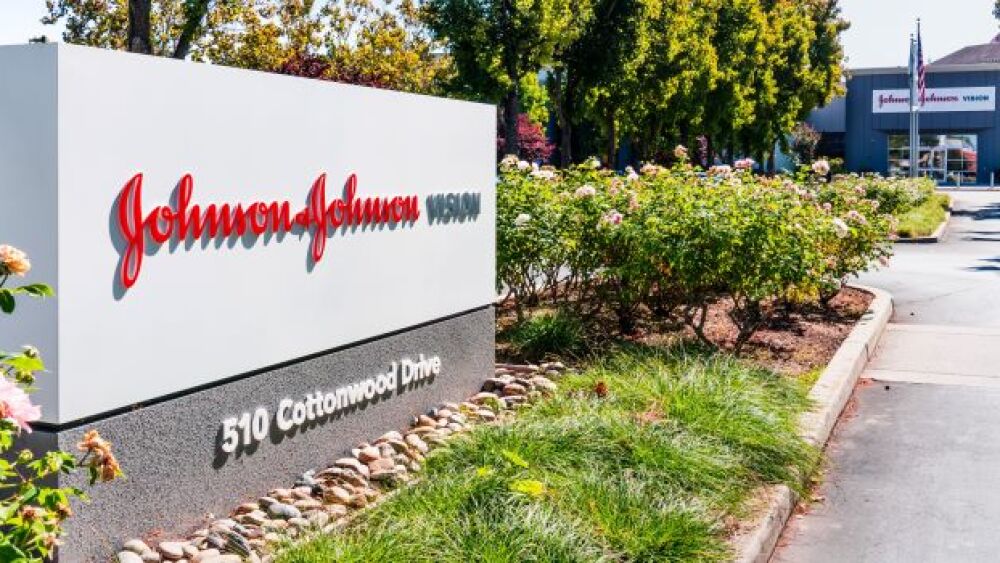A proposed class-action lawsuit accuses Johnson & Johnson of failing to negotiate fair prescription drug prices for its employees, but experts note that the company is also on the hook for benefits costs.
Pictured: Johnson & Johnson Vision offices in Silicon Valley/iStock, Sundry Photography
Johnson & Johnson was sued Monday in federal court by an employee who claims the company failed to negotiate better terms for coverage of prescription drugs under its health plan. The suit lists multiple examples in which prices purportedly charged under the plan were far higher than what patients without insurance would have paid for the same drug at a retail pharmacy, claiming that this added up to millions of dollars in extra costs to the plan and employees. The lawsuit proposes to form a class of participants in J&J’s employee health plan.
“The allegations and legal theories asserted in the complaint are meritless and, therefore, we will be moving to dismiss the complaint in its entirety,” a J&J spokesperson told BioSpace.
The suit is based on J&J’s obligations under the federal Employee Retirement Income Security Act (ERISA), which states that private employers have a fiduciary responsibility in managing retirement and health benefits, meaning that they must “run the plan solely in the interest of participants and beneficiaries and for the exclusive purpose of providing benefits and paying plan expenses,” according to the Department of Labor.
J.J. Conway, who owns a Detroit-area law firm specializing in employee benefits issues, told BioSpace that “ERISA is kind of an unusual area. . . . It’s one of the few areas that allows employees to actually take control of one aspect of their employers’ budget.” While he’s not aware of other cases around prescription drug costs under ERISA, Conway said the case is reminiscent of others in recent years that have challenged high health insurance costs or alleged excessive 401(k) fees.
The suit, filed in New Jersey by Wisconsin-based J&J employee Ann Lewandowski, alleges that the company’s agreement with its pharmacy benefit manager allowed highly inflated costs for many drugs. For example, it says that the healthcare plan and participants were charged more than $16,000 for 180 units of the generic multiple sclerosis drug dimethyl fumarate, a more than 13,000% markup from the average cost to pharmacies of $120.60 for the drug.
“One way in which Defendants have mismanaged the Plans is by agreeing to steer beneficiaries toward Express Scripts’ mail-order pharmacy Accredo, even though Accredo’s prices are routinely higher than retail pharmacies charge for the same drugs,” the suit says.
In addition to resulting in potentially inflated out-of-pocket costs to employees for prescription drugs, these prices would be reflected in higher health insurance premiums and possibly in depressed wages due to the employers’ relatively high overall compensation costs, according to the suit. It lists examples of employers that it says have fulfilled their fiduciary responsibilities, in contrast to J&J, by using alternative pharmacy benefit managers, negotiating drug costs or other means.
“Not incidentally, Johnson and Johnson is a leading drug maker that earns billions of dollars a month selling drugs,” the suit notes.
David Klimaszewski, a partner at Culhane Meadows in Dallas who focuses on employee benefits and compensation, said he suspects J&J was targeted because it is itself a drugmaker. He said he doesn’t find the suit persuasive because employers pay the bulk of the costs of health insurance plans. “You’re suing Johnson & Johnson, and Johnson & Johnson was the party that was hurt most by this, so the lawsuit just doesn’t seem to really make a lot of sense,” he told BioSpace.
Conway says the power ERISA affords employees to have a say in employers’ business decisions is a unique feature of the law. “As companies begin these rolling layoffs . . . this could be an area where motivated employees start to really scrutinize the benefit plans and say, ‘hey, we can find some cost savings here. And we can save some jobs while we’re at it,’” he said.
Klimaszewski also said it’s possible that some high drug prices could be part of an agreement with a pharmacy benefit manager that is overall a good deal for an employer’s health care plan. “It might actually be completely a reasonable fiduciary decision to agree to pay $100 for one particular drug that was a cheap drug, if you can get all these other drugs for the price of, say, $10. And maybe these other drugs are the ones that almost everybody on the plan uses.”
Shawna Williams is a freelance writer and editor based in New York City. She can be reached at shawna.williams@biospace.com or on LinkedIn.






